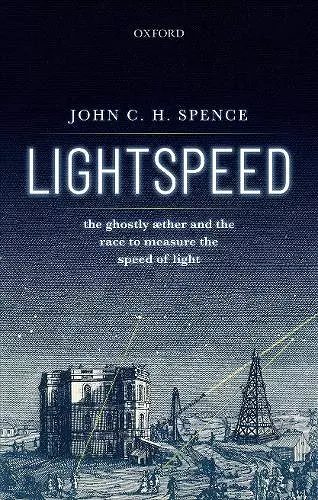Lightspeed
The Ghostly Aether and the Race to Measure the Speed of Light
Format:Hardback
Publisher:Oxford University Press
Published:14th Oct '19
Currently unavailable, and unfortunately no date known when it will be back

This book tells the human story of one of man's greatest intellectual adventures - how it came to be understood that light travels at a finite speed, so that when we look up at the stars, we are looking back in time. And how the search for a God-given absolute frame of reference in the universe led most improbably to Einstein's most famous equation E=mc2, which represents the energy that powers the stars and nuclear weapons. From the ancient Greeks measuring the solar system, to the theory of relativity and satellite navigation, the book takes the reader on a gripping historical journey. We learn how Galileo discovered the moons of Jupiter and used their eclipses as a global clock, allowing travellers to find their Longitude. And how Ole Roemer, noticing that the eclipses were a little late, used this to obtain the first measurement of the speed of light, which takes eight minutes to get to us from the sun. We move from the international collaborations to observe the Transits of Venus, including Cook's voyage to Australia, to the achievements of Young and Fresnel, whose discoveries eventually taught us that light travels as a wave but arrives as a particle, and all the quantum weirdness which follows. In the nineteenth century, we find Faraday and Maxwell, struggling to understand how light can propagate through the vacuum of space unless it is filled with a ghostly vortex Aether foam. We follow the brilliantly gifted experimentalists Hertz, discoverer of radio, Michelson with his search for the Aether wind, and Foucault and Fizeau with their spinning mirrors and lightbeams across the rooftops of Paris. Messaging faster than light using quantum entanglement, and the reality of the quantum world, conclude this saga.
The richly illustrated study and reference book Lightspeed tells in a pleasant and fascinating way the course of history in the search for the natural presence of light and its physical properties. * Jan M. Broeders, Optische Fenomenen [translated] *
In his highly informative and entertaining book Lightspeed: the Ghostly Aether and the Race to Measure the Speed of Light, John Spence recounts the history of humanity's attempts to understand light and measure its speed. This may seem like a narrow focus, but light is so fundamental to the nature of the universe that this history encompasses most of the essential developments in physics, and features all of the giants – from Galileo to Einstein to today's quantum computer scientists. * David Appell, Physics World *
From Faraday and Maxwell describing how light propagates to Einstein showing the constancy of the speed of light and all else entailed in his theories of special and general relativity, John Spence recounts this history with a focus on the key personalities that helped it move forward, the science they did and the legacy they left behind. * Marios Karouzos, Nature Astronomy *
ISBN: 9780198841968
Dimensions: 224mm x 145mm x 21mm
Weight: 466g
256 pages